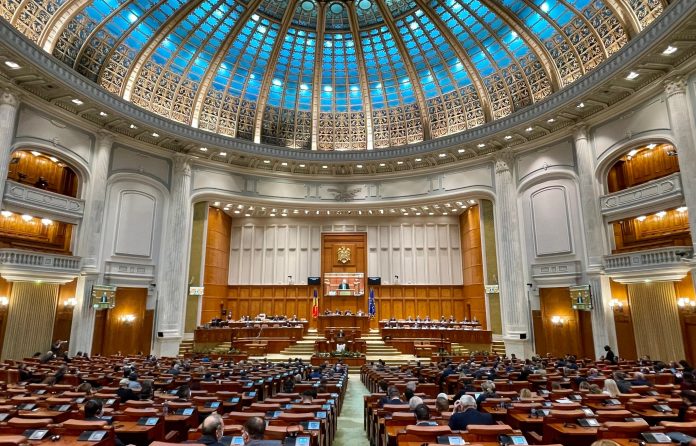The two chambers of the new Parliament elected in the December 1 election are set to convene on Friday, as of 2 pm, in separate sessions, to open the 2024 – 2028 legislature, at the call of president Klaus Iohannis.
The sessions will be chaired by the deputy or senator with the highest number of parliamentary mandates, as a senior president, assisted by the four youngest deputies or senators, as his/her secretaries. In the event that two or more deputies or senators have held the same number of parliamentary mandates, the oldest of them will lead the proceedings.
No parliamentary debates can take place in these first meetings, during which validation committees composed of 30 deputies or 15 senators, respectively, will be established, according to the political configuration of each chamber.
These committees will verify whether the election of new parliamentarians was carried out in compliance with the provisions of the electoral law and will draw up validation reports.
According to the Senate Regulations, the validation committee will propose the invalidation of the election of a senator if it finds that his election was made in violation of the provisions of the electoral law regarding candidacy or obtaining the mandate, as well as if there is a final and irrevocable decision regarding the commission by the senator in question of a crime related to the conduct of the electoral process.
The hearing of senators for whom the invalidation of the election has been proposed is mandatory both within the validation committee and in the plenary session of the Senate. Before the validation committee, the person in question may choose a defender from among the members of the Senate or may be assisted by a lawyer with the right to submit conclusions to the High Court of Cassation and Justice.
Also, according to the Rules of Procedure of the Chamber of Deputies, the validation Committee will propose the invalidation of the election of a deputy if it finds a violation of the constitutional and legal provisions regarding the eligibility conditions and/or if it finds that there is a final court decision of conviction for the commission by the respective deputy of a crime related to the conduct of the electoral process.
In the case of deputies for whom the invalidation of the mandate has been proposed, the Chamber of Deputies debates and decides by vote for each case separately.
The validation or invalidation of the mandates is done by the vote of the majority of the deputies or senators present.
Subsequently, the deputies and senators whose mandates have been validated will take the oath.
The Chamber of Deputies and, respectively, the Senate are considered legally constituted after the validation of two-thirds of the deputies’ mandates or three-quarters of those of the senators and after they have taken the oath. Parliamentarians who refuse to take the oath are considered invalid.
After the legal establishment of the Chamber of Deputies and the Senate, the presidents of the two legislative bodies and the other members of the Permanent Bureaus – vice-presidents, secretaries and quaestors – are elected. The parliamentary groups are also presented and the parliamentary committees are formed, according to the political configuration of each chamber.
The election of the president of the Chamber of Deputies and, respectively, of the Senate takes place by secret ballot, with ballot papers. Each parliamentary group can make only one proposal. The candidate who has received the votes of the majority of the deputies or senators present is declared elected president of the legislative body.
The Permanent Bureau of the Chamber of Deputies and, respectively, of the Senate is formed following negotiations between the leaders of the parliamentary groups, respecting the political configuration, the lists being subject to a secret ballot with balls.
Following the December 1 election, a total of 465 members of parliament were elected – 331 deputies and 134 senators, according to the lists submitted by the Central Electoral Bureau.
PSD (Social Democratic Party) holds 122 seats (36 in the Senate and 86 in the Chamber of Deputies), AUR (Alliance for the Union of Romanians) – 91 seats (28 in the Senate and 63 in the Chamber of Deputies); PNL (National Liberal Party) – 71 seats (22 in the Senate and 49 in the Chamber of Deputies); USR (Save Romania Union)- 59 seats (19 in the Senate and 40 in the Chamber of Deputies); S.O.S. Romania Party – 40 seats (12 in the Senate and 28 in the Chamber of Deputies); UDMR (Democratic Union of Hungarians of Romania) – 32 seats (10 in the Senate and 22 in the Chamber of Deputies); Young People’s Party (POT) – 31 seats (7 in the Senate and 24 in the Chamber of Deputies).
Also, 19 deputy mandates were assigned to representatives of national minorities.
AGERPRES




